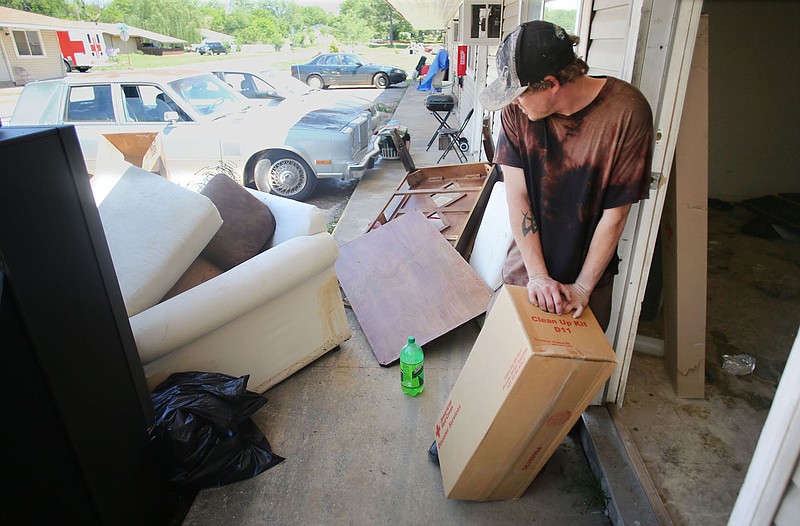FAYETTEVILLE -- The city may buy an apartment complex on the west side of town so it can demolish it and turn it into green space.
The City Council on Tuesday heard a presentation from Alan Pugh, staff engineer with the city, on potential flood mitigation measures for residences near Hamestring Creek. The city recently became aware of potential grant opportunities with the federal government to help with the costs of elevating homes or buying land in the floodplain.
City staff have been working with property owners on potential solutions, Pugh said. Federal money probably would become available late next year, he said.
In the meantime, administrators are proposing to use bond money to buy the West End apartments east of Interstate 49 and north of Wedington Drive. Asking price is $1.4 million, and the city had the property appraised at $1.39 million. The city wouldn't have to wait until next year if it used bond money, and the owner is looking to sell now, Pugh said.
The 49-unit complex with four buildings experienced significant flooding in April 2017 and May this year, Pugh said. Pictures Pugh showed the council from the May rain storm showed water rose a few feet from the ground, infiltrating units and causing extensive damage to the buildings, tenant belongings and cars.
"In reality, the best way to solve the flooding for those particular apartments would be to purchase them and remove the structures," he said.
Replacing the buildings with green space, trees or a retention pond could alleviate flooding for surrounding residences as well, Pugh said. The city would do a study to determine the impact of those measures to surrounding properties, he said.
John Cloyed, owner of the complex, said he's open to selling to the city, but the property is under contract to be sold to someone else. If the prospective buyer were to ask for an extension on the closing date or pull out of the deal and the city had an offer on the table, Cloyed said he could sell to the city instead. Closing date for the other buyer is set for mid-August, he said.
The complex has been vacant since the May flooding event, Cloyed said. The damage rendered units uninhabitable. Cloyed reimbursed tenants for May rent and they received assistance from the Red Cross to relocate, he said.
"It was tough," Cloyed said. "It was definitely hard for a lot of them, and for me, that's the biggest reason to not rebuild there. It will happen again, whether it's five years or two years or 10 years."
Tenants paid the fair market rate as set by the U.S. Department of Housing and Urban Development, which changes yearly, Cloyed said. Most received rent assistance through the Fayetteville Housing Authority, the city's Hearth program, Section 8 or veteran housing vouchers, he said.
Cloyed said the prospective buyer is aware of the risk. The property has flood insurance. If the prospective buyer wanted to reopen the complex to tenants, he would be looking at a substantial amount of work to get the units habitable again, Cloyed said.
The Fayetteville Housing Authority's development nonprofit nearly bought the complex for $1.6 million a few years ago. The nonprofit was to buy the complex under a lease-to-own agreement, but last year, agreed to give the property back to Cloyed. Housing Authority board members at the time said the covid-19 pandemic made it so tenants could not pay rent and the board decided not to follow through with the purchase.
Cloyed subsequently filed a lawsuit last year against the Housing Authority's nonprofit, saying the property was returned to him in poor condition. The nonprofit was under obligation to return the property to Cloyed in the same condition as received. Cloyed said units had water leaks, mold, spray painted walls, damaged flooring and missing doors and appliances. He seeks a judgment to compensate expenses incurred to fix the units.
Cloyed said his selling the property likely would not have bearing on the lawsuit, which is still pending in Washington County Circuit Court.
If the city buys the property, money would come from the $15.8 million drainage bond issue voters approved in April 2019, Pugh said. Land acquisition was among the options outlined in the issue, he said.
Pugh said he hopes to have a proposal for the council to consider during its Aug. 18 meeting.
Mayor Lioneld Jordan asked City Council members Tuesday about whether to pursue purchasing the property, and members expressed support. Council Member Sloan Scroggin said he has spoken with residents before about the need for the city to buy the complex and tear it down.
"While I'm glad there's a cheap place for people to live, the people who move into a cheap place don't need to live in a place that floods on a very regular basis," Scroggin said. "Those units are barely habitable."
